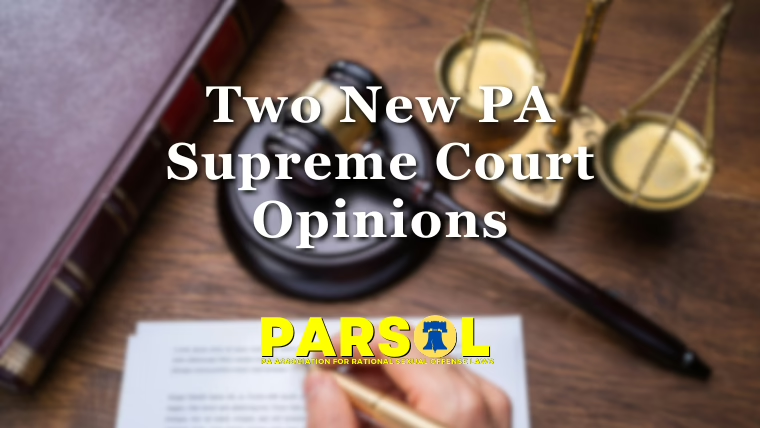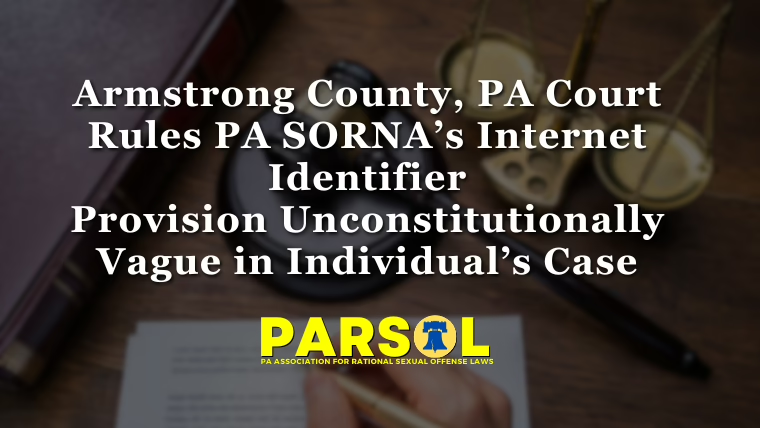We have seen it again. The Pennsylvania Supreme Court (SCOPA) has relied on Commonwealth v. Lacombe in the ruling of T.S. v. PA State Police (PSP). T.S. argued that PA’s SORNA Subchapter I violated the Federal and State Ex Post Facto Clauses. The basis of his argument is on the fact that his offense occurred prior to the enactment of any PA registry. The problem is that SCOPA had already ruled in Lacombe that Subchapter I is non-punitive hence it does not violate ex post facto laws; therefore, cementing the current registry scheme as a civil collateral consequence. All SORNA ex post facto challenges in PA are officially dead-on-arrival.
Aaron Marcus, attorney with the Defender Association of Philadelphia, spoke about four limitations ex post facto challenges have when trying to reform registry laws during his presentation at NARSOL’s Litigation Summit this past November. These limits are 1) they don’t challenge the registry’s assertion that registrants are likely to re-offend, 2) the legislators can create a new law without the punitive factors, 3) future ex post facto challenges are made null and void by the new law, and 4) sentence finality problems (e.g. arguments again in the courts, time-bars, resentencing). As a result of the second limitation, those who would’ve been given relief by the courts due to a successful challenge would be recaptured under the new law.
Here’s how it played out in PA. On July 19, 2017 SCOPA ruled that SORNA was punitive and in violation of ex post facto laws for persons whose offenses were committed before Dec. 20, 2012 in the case of Com. v. Muniz. The PA General Assembly made some insignificant reform changes when they passed Acts 10 and 29 of 2018 in February and June, respectively, creating the “non-punitive” Subchapter I of SORNA II to reel back in as many of the pre-Dec. 20, 2012 persons as possible. Again, the statute had to be argued in the courts on ex post facto. On July 21, 2020, SCOPA ruled in Com. v. Lacombe Subchapter I of SORNA II was non-punitive and does not violate ex post facto laws forever now making ex post facto challenges null and void. After seeing this, it is fair to say that ex post facto challenges can do more harm than good. Take note on the decision dates of Muniz and Lacombe, three years and two days for a final sentence.
Where do we go from here? Mr. Marcus believes “due process arguments will fair better in the long term in state courts”. I agree! PA’s Due Process Clause is in the PA Constitution Art. I Sec. 11, “[a]ll courts shall be open; and every man for an injury done him in his lands, goods, person or reputation shall have remedy by due course of law, and right and justice administered without sale, denial or delay. Suits may be brought against the Commonwealth in such manner, in such courts and in such cases as the Legislature may by law direct” (emphasis added). The appropriate methods of due process in PA to challenge SORNA would be to apply the Irrebuttable Presumption Doctrine with strict scrutiny. These methods are for when a fundamental right is being violated.
What fundamental right in PA is SORNA violating? We can find it in Art. I Sec. 1, “All men are born equally free and independent, and have certain inherent and indefeasible rights, among which are those of enjoying and defending life and liberty, of acquiring, possessing and protecting property and reputation, and of pursuing their own happiness” (emphasis added). Our indefeasible right to reputation is being violated by SORNA’s irrebuttable presumption that “[s]sexual offenders pose a high risk of committing additional sexual offenses,” PA’s Title 42 Sec. 9799.11(a)(3). I highly stress “indefeasible” and “reputation” because together they make a unique fundamental right to Pennsylvanians. “Indefeasible” is defined, “(of a claim or right) not vulnerable to being defeated, revoked, or lost;” Garner, Black’s Law Dictionary. (5th pocket ed. 2016). It is an extraordinarily strong term that makes our fundamental rights impossible to take away. You might think this as a bold claim but look it up in other dictionaries.
How would this all work? An irrebuttable presumption, under the Irrebuttable Presumption Doctrine, fails when 1) it encroaches on an interest protected by the due process clause, 2) it is not universally true, and 3) reasonable alternative means exist for ascertaining the presumed fact. Experts in the field of re-offense rates of those who commit a sexual offense can present data that would discredit SORNA’s presumption. Then, strict scrutiny would force the State to prove they still have a compelling governmental interest to violate an indefeasible right with SORNA still written as is but without the irrebuttable presumption and prove it is narrowly tailored to achieve said interest. In the end, SCOPA would first rule the presumption violates the Irrebuttable Presumption Doctrine and then rule SORNA fails strict scrutiny because it’s overly broad and not narrowly tailored without the debunked presumption.
Who is challenging SORNA’s presumption? Mr. Marcus is one of the attorney’s in Com. v. Torsilieri that is challenging SORNA’s presumption. The Chester County Court of Common Pleas has a beautifully written opinion in favor of Mr. Torsilieri: https://mitchellhamline.edu/sex-offense-litigation-policy/wp-content/uploads/sites/61/2020/06/Trial-Court-Opinion.pdf. The case was brought before SCOPA in 2019 but has decided that an evidentiary hearing in the Common Pleas Court is needed to properly argue SORNA’s presumption with expert testimonies. This process could be drawn out for about another two years. I know that the empirical data on re-offense rates of persons convicted of sexual offense rates are in our favor. I remain optimistic




